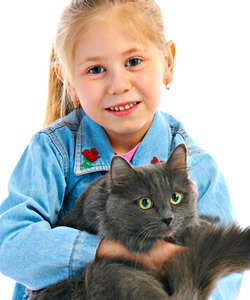Children and pets
 Children can form a wonderfully close bond with their pets. Apart from the obvious companionship and affection, there are many other benefits for children sharing their lives with a pet.
Children can form a wonderfully close bond with their pets. Apart from the obvious companionship and affection, there are many other benefits for children sharing their lives with a pet.
- Pets teach responsibility — children learn about the requirements of a living being such as food, water and exercise.
- Aid childhood development — pets help children develop nurturing and social skills. Developing positive feelings about pets can aid self-esteem and help children develop verbal communication and compassion.
- Be a friend to children — children turn to pets when they need a friend, confidante or protector. Children often refer to their family pet as their 'best friend'. As pets do not judge children or get angry at them, children often trust them with their secrets and private thoughts.
- Teach life lessons — pets are often the first experience a child has with death and grieving.
- Be fun — pets provide unconditional love and affection. Children can participate in safe games with their pets.
Parents are the first and most influential educators in their child's life. Teaching your child about the joys and responsibilities of pet ownership starts from an early age as they learn from your interaction and the way you nurture and guide their experiences with their pets.
Pet ownership resources for parents and children
- The 'We are family' program is a guide to nurturing the child and pet relationship. It is aimed at educating expectant and new parents on the many advantages of having a pet in the family for their child. It also informs parents of the potential risks, and provides the knowledge, skills and strategies to ensure that the experience is not only a physically and emotionally enriching one, but a safe one as well.
- The 'Living safely with dogs' and the 'Responsible pet ownership' programs provide school visits and education resources for preschool and primary school aged children in Victoria.
Page last updated: 01 Oct 2025